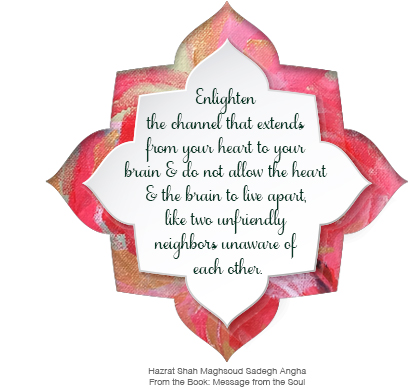Religion is a Reality
Holy Qur'an (51:6)
"The practice of religion is often limited to individuals attending various religious institutions. The purpose of this practice varies, but includes fear of punishment, hope of reward for good deeds, feelings of guilt, soothing their soul, or for social and cultural purposes. But this is not the reality of religion."1
"When we ask most people: "How do you really know God exists?" They usually reply that their inward feeling assures them of the existence of God. But how much can one depend on so-called "feelings" and senses?"2
A famous parable of Rumi’s illustrates this point.
An elephant was in a dark building. Some people from India had brought it for exhibition.
Many people kept going into that dark place in order to see it.
Each one was stroking it with his hands in the dark, since seeing it with the eyes was not possible.
In the case of one person, whose hand landed on the trunk, he said, "This being is like a drain pipe."
For another one, whose hand reached its ear, to him it seemed like a kind of fan.
As for another person, whose hand was upon its leg, he said, "I perceived the shape of the elephant (to be) like a pillar."
And in the case of another one, who placed his hand upon its back, he said, "Indeed, this elephant was like a throne."
In the same way as this, any one who reached a part of the elephant used his understanding in regard to any particular place he perceived by touch.
Their words were different and opposing because of the different viewing places. One person gave it the nickname of the bent letter "dâl;" this other one, of the straight letter "alif."
If there had been a candle in the hand of each person, the disagreement would have gone out completely from their speech.3
The veils of ignorance are removed when the light of knowledge manifests the reality. Realizing the knowledge within, beyond the limitations of the experiences of the senses, beyond accepting other people’s behavior, beyond practicing false rituals, beyond blind mental belief, and beyond doubt and uncertainty is what Sufism is about.
The Holy Qur'an states (51:6): "Religion is a reality," a reality that needs to be cognized.
Sufism is about discovering this reality. It is about the knowledge of Self that leads to the knowledge of God.
Molana Salaheddin Ali Nader Angha, ‘Pir Oveyssi' describes the reality of religion as follows:
"The word Irfan captures the essence of Sufism. Irfan is derived from the word marifa, which means cognition. In this context, it means self-knowledge that leads to knowing the reality of Existence and being replete with divine knowledge or mysteries. It is the way of Prophets. This is why I have defined Sufism as the reality of religion."4
